The holy month of Ramadan in Argentina coincides this year with the arrival of winter, when temperatures drop, and the hours of fasting are reduced, ranging between 9 and 11 hours, depending on the time difference between the cities, making it easier for the Moroccan community living in this country to enjoy the month of Ramadan without fatigue or tiredness, but with nostalgia and longing to the atmosphere of the holy month of Ramadan in their country of origin, Morocco.
Six years ago, Mohamed Moradi, 36, arrived in Argentina, particularly Buenos Aires, time passed very quickly, but every time Ramadan comes, it carries with it memories of Morocco, because this holy month tastes special and makes the son of Casablanca feel unable to find himself in the new argentine environment, despite his attempts to live in a similar environment with members of Muslim communities resident in this country.
In an interview with MAP news agency, Moradi said that once Ramadan comes, some begin to count the hours of fasting and believe that Argentina is one of the best climatically suited countries for Ramadan , adding that there are people who say that Muslims in Argentina do not feel hunger or thirst during the days of fasting, forgetting that during the holy month in this country “we are deprived of the atmosphere of Ramadan to which we are accustomed to in Morocco where the fasting person feels the warmth of the family at the table of the Iftar hearing the adhan (call to prayer) of the five daily prayers and seeing the mosques filled with worshipers”
If the Ramadan fasting could be compared in a Muslim country like Morocco to other countries like Argentina, the comparison should be on this basis and not on the number of hours of fasting, underlines Moradi, highlighting the role of schools and cultural institutions in Argentina, especially in Buenos Aires, Cordoba, Mendoza, Tucuman and other cities in bringing closer together the Muslim community and providing a special programming for this Holy month through organizing cultural, sports and educational activities.
But all of this, for El Moradi, who works as a professor of Arabic at the University of Buenos Aires as well as a translator-interpreter at the King Fahd Islamic Cultural Center in the capital of Argentina, is still insufficient to compensate for what Moroccans feel by being away from their families and friends, “Nothing can make up for the atmosphere of a family sitting at a Moroccan Iftar table”.
Moradi, who also worked as a teacher in "Hassan Ibn Thabit" high school in the Moroccan city of "Zayo" before deciding to join his Argentinean wife "Naima," says he is trying to live Ramadan in a Moroccan way by listening to religious recitations of the Moroccan Koran reciters through websites of Moroccan stations and Radio programs, a tradition he perpetrates annually.
Moreover, El Moradi believes that intermarriage has some negative aspects that appear especially on religious occasions such as Ramadan, noting in this context that the foreign spouse can take the initiative to congratulate the arrival of the holy month and help in preparing the Iftar, but there are other difficult emotional aspects of sharing with her husband because of the difference of culture, identity and religion.
He adds that he is willing to educate his daughter "Sukaina" aged a year and a half, according to Islamic teachings and hopes to carry it on his next visit to Morocco to meet his family.
Meanwhile, Khaira Mouhyi Eddine, professional cook and Moroccan resident in Buenos Aires for years, says the atmosphere of Ramadan in Argentina is very different from the traditions and customs of Muslims living in their home countries during the holy month, and points that the pace of work does not change, to the point that the person fasting may be required to break his/her fast in the workplace.
She adds that when she returns home, she tries to keep in touch with her family in Morocco through social networks to talk to them and evoke the Moroccan atmosphere of Ramadan.
For his part, Mohamed Bennis, who has spent 18 years in Argentina working on foreign diplomatic missions, says he is trying to make the days of Ramadan a chance to meet other Moroccans living in the same country and share with them the collective Iftar table his wife prepares with typical Moroccan dishes.
He concludes that despite the years he spent in Argentina the most beautiful month of Ramadan happened in 2010 when he visited his hometown of Fez and he’s trying to relive that earnestly today in Argentina.

